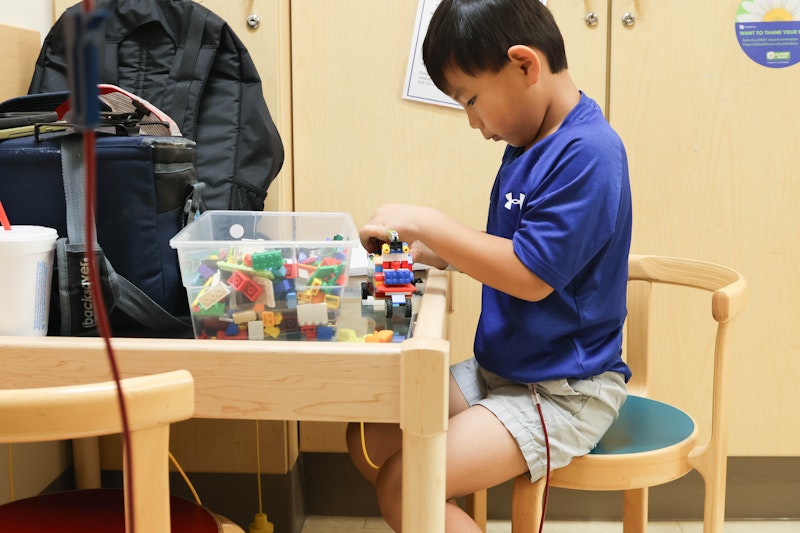Transfusion-Dependent Boy Counts on KBC Donors

Dec. 19, 2024
Noah Ray Bojun West is somewhat of a celebrity at Kentucky Children’s Hospital’s DanceBlue Clinic.
Between his outgoing personality, a penchant for playing games and a smile that could light up a room, rarely has Noah met a person he isn’t friends with. It’s why Noah looks forward to his day out with dad, Samuel West, every two or three weeks when they head to the hospital to see his pals.
The issue is that these visits to UK HealthCare aren’t just for fun. His life depends on them.
Noah has a lifelong condition called beta thalassemia major, also known as Cooley’s anemia. The more minor variations of the blood disorder are life-altering that result in anemia, slow growth, bone abnormalities and an increased risk of developing blood clots. In Noah’s case, his blood is missing a beta protein that severely impacts his hemoglobin, which facilitates the transport of oxygen in red blood cells to the body’s organs and tissues.
Put more simply, the blood his body produces is unusable. In his current condition, Noah requires blood transfusions every two to three weeks.
“He is completely reliant on transfusions,” Sam said.
Sam and his wife, Greta, adopted Noah from China knowing full well the challenge they were taking on. After raising five kids of their own, Sam and Greta felt like they had more love to give, so they adopted two girls from China and went back for a third after Sam felt a tug on his heart visiting the orphanage the first time.
Sam thought long and hard about the daily care Noah would need after talking to a hematologist about the hereditary blood disease that occurs primarily in people of Mediterranean, Middle Eastern and Asian descent. He had seen pictures of kids with protruding stomachs because of enlarged organs, children suffering from facial distortion and little ones with jaundice.
The Wests’ faith outweighed all fears.
“Even though he’s adopted, he’s my son,” Sam said. “I wouldn’t want anything to happen to him. It doesn’t lessen the degree of love I have for him. It’s definitely a scary undertaking. Only with God’s help and blood donors are we able to manage through it.”
Noah’s visits to UK are an all-day affair. After breakfast with dad, medical officials must test for antigens and match his blood. The more transfusions he gets, the more difficult that gets. A few hours later the blood bag comes, and the transfusion takes place through a port in his chest. More hours pass until Noah feels like himself again – albeit temporarily.
Noah also undergoes annual MRIs and visits to Atlanta to monitor the iron overload his body receives from the regular transfusions. He also takes a daily cocktail of chelation to extract some of the iron.

There is a hope that Noah may one day be free of blood transfusions. Some children have been cured of the disorder through gene therapy, which the Wests are lobbying hard for with their insurance company. At the moment, the out-of-pocket cost is simply not feasible.
“He’s told my wife that he doesn’t want to do that (gene therapy) because he would miss all his friends,” Sam said. “I don’t think he really understands the gravity of the whole thing. The more transfusions you get, the more complications you’re going to have in the long haul. The goal is to get him free of transfusions.”
Until then, Noah, however oblivious the 7-year-old is to his critical need, relies on the generosity of Kentucky donors to maintain that infectious smile and heart-pulling personality.
“(Blood donation) has given us our son,” Greta said. “He’s just the sweetest baby. He’s so sweet and we’re so thankful. We can never thank people enough for donating blood. It’s like there’s so much stuff going on in the world. I don’t care. I’m just so thankful that you give. I’m just thankful for people that will give blood to let us have him in our lives.”
Sam, who has struggled with lightheadedness in previous Kentucky Blood Center donations at Toyota Motor Manufacturing Kentucky and Bourbon County Community drives, asks donors to put themselves in others’ shoes when the deterrents of donation pop up in their mind.
“Put a face to that moment,” Sam said. “I think, if my son can go through so many needles, and he’s a trooper and he’s working through it, why can’t I go through that little bit? If you can put a face to it, it helps you through it.”
About Kentucky Blood Center
KBC, the largest independent, full-service, nonprofit blood center in Kentucky, has been saving local lives since 1968. Licensed by the FDA, KBC’s sole purpose is to collect, process and distribute blood for patients in Kentucky. KBC provides services in 90 Kentucky counties and has donor centers in Lexington, Louisville, Frankfort, Pikeville, Somerset and the Tri-County area (Corbin).
